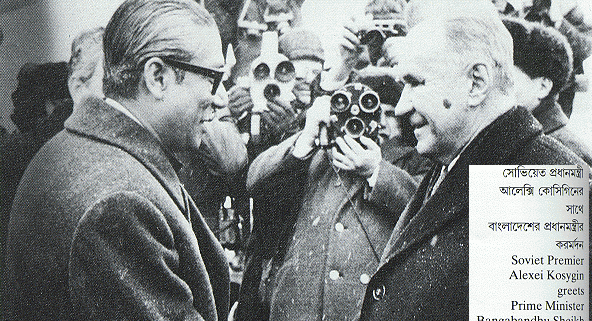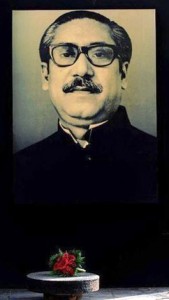A leader of third world
Moulana Abdul Hamid Khan, widely known as Bhashani was a rural based Muslim leader. He passed his life struggling for the right of oppressed people. He was born in 1880 in the village of Dhangara, a province of Bengal in India (now Banglagesh). He got his religious education in a Madrasa.He started politics from his earty life taking part in various political movements. Towards 1904 he visited Asam. He was seriously shocked seeing the suffering of oppressed peasants that caused due to usury system imposed on them by the land lords After returning from Asam he arranged “All Bengal Peasant Conference’ in Shirajgong (now Bangladesh) and organized peasants in a protest rally and forced the land lords to abolish the usury system. He also tried to organize another peasant rally in the village of Kagmari in Tangail (now Bangladesh) but failed as the British law enforcing authority forced him to leave Tangail and banned his entrance to Mymensing. After completing his religious schooling in 1909, he started teaching in a Primary school at Kagmari. In 1919 he joined in Khelafat movement and for protesting against the dissolution of khilafat (Caliphate) system in Turkey he was arrested in 1920. Later in 1921 he took part in non-cooperation movement against the British imperialism and again faced imprisonment. He joined Muslim League In 1930.In the same year he went to Asam again and opened a provincial branch of Muslim League there in order to unite the peasants. Since then he had been devoting himself to Pakistan movement. Apprehending that Bhashani might turn his peasant movement into political movement, Asam Government arrested him.
During his 15 years political leadership in Asam he was arrested eight times. Pakistan got independence in 1947 and due to geographical location Pakistan was divided as West Pakistan and East Pakistan. Bhashani was released from jail after independence. After his return to East Pakistan in 1948 he organized a hunger march in protest of food policy and for the first time he was arrested by Pakistan government in 1949. He started hunger strike in jail and on the ground of ill health he was released in the same year. He founded “Awami Muslim League,” a first opposition party in Pakistan. He formed “All Party Language Movement Committee” in 1952 demanding Bengali as a national language of East Pakistan. During the language movement he was arrested and was released after a year.
He left Muslim League in 1953 and formed “Jukto (united) Front.” His party won the election capturing 290 of 300 seats of the assembly in 1954. Due to serious disagreement with some party leaders he quit “Jukto Front”and formed “National Awami Party”.. During the military rule of General Ayub Khan, Bhashani was arrested and held in prison for about 5 years. He was released after he had gone on hunger strike in jail. In 1963 Bhadhani led a goodwill delegation to China and met Mao Tse Tung and Chou- En-Lai.
Due to his inclination towards China he was nick named as “Red Moulana.” In 1969 Sheikh Mujib was arrested on the charge of Agartala conspiracy case and was detained in Dhaka Cantonment. Bhashani gheraoed (encircled) the Cantonment by millions of people forcing Ayub Khan to release Sheikh Mujib unconditionally. During the liberation movement in 1971 Bhashani went to India and suggested Indian government not to get involved itself in liberation movement. Fearing unwanted consequences that might go against the interest of India, Indian Government put Bhashani under house arrest. After the liberation war in 1971, Bhashani returned to Bangladesh in march,1972.
He led a hunger strike and long hunger march against the presidency of Sheikh Mujibur Rahman in 1974. After the assassination of Sheikh Mujibur Rahman in 1975, he organized a long march with millions of people against India in protest of construction of Farakka Barrage and withdrawal of Ganges water to west Bengal. Bhashani dedicated his life for the oppressed people irrespective of caste and creed..He directed his all movements through non-violence and non-cooperation. He introduced gherao technique, a way to encircle the official to bend the authority to accept the demand. He passed a vital part of his life in jail and led hunger strike for several times.. He had strong faith in religion and was strictly adhered to the principles of Islam.. He was a man of speaking the truth, doing the right things and totally uncompromised to injustice. He passed his life very simply wearing coarse cloth and living on simple food. He was a selfless and courageous leader of the third world. He died in November 1976 in Dhaka leaving Millions of Bengalies mourning.
Author : Snehaloy is based in Dhaka, Dhaka, Bangladesh, and is Stringer for Allvoices Report Credibility











Leave a Reply
Want to join the discussion?Feel free to contribute!